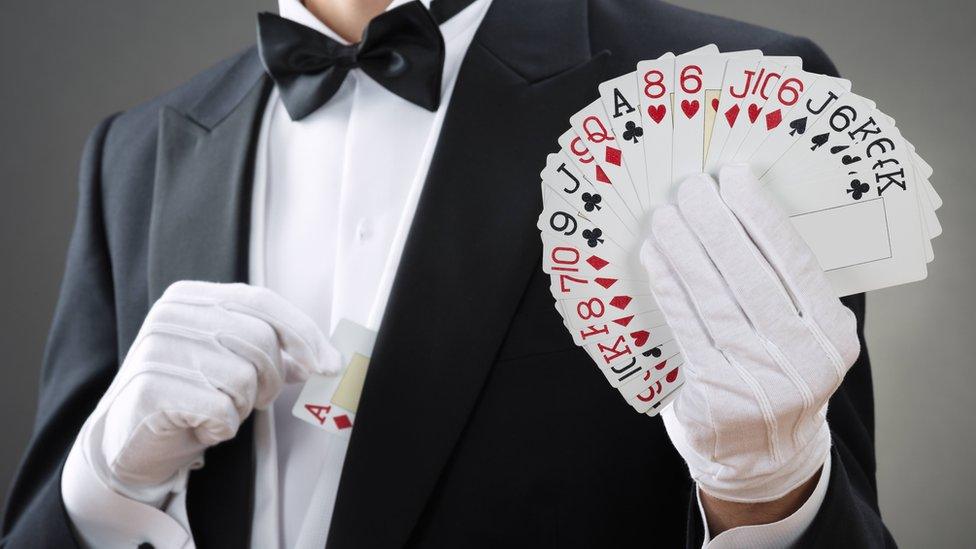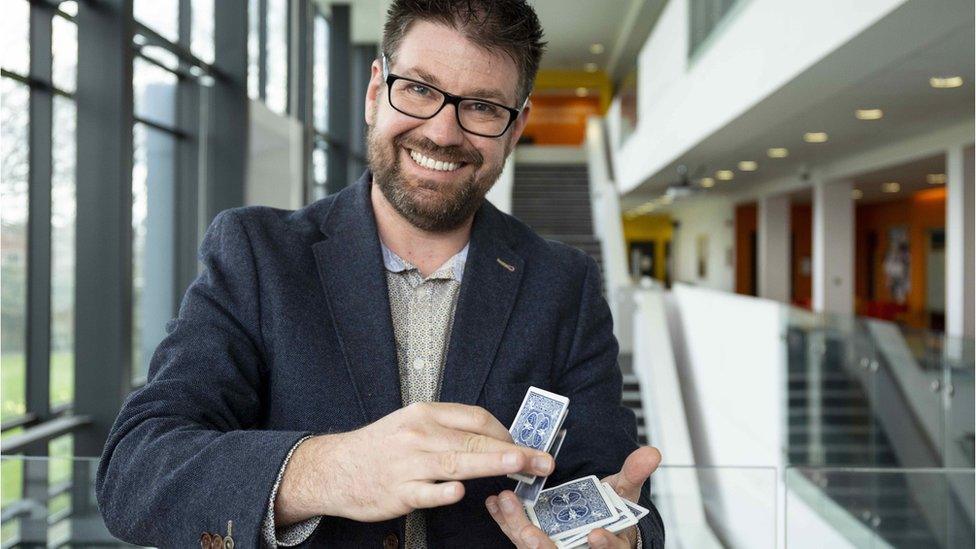Magicians' tactics found in politics and marketing
- Published
- comments

The "forcing techniques" of magic can also be used by businesses and politicians
Understanding how magic tricks work could help to protect people from manipulation by politicians and marketing, say researchers.
A study from Goldsmiths, University of London, says the psychology used by magicians to deceive audiences can also be used to influence consumer choices.
Magic tricks use "powerful tools" to control behaviour, say the researchers.
The psychologists looked at how tricks create an "illusion of choice", when the audience has no real control.
The research - Mind control trick: magicians' forcing and free will, by psychologists Alice Pailhes and Gustav Kuhn - examines how magicians control their audiences' decisions - and how this can be applied to other areas.
'Full control'
"A lot of these magic principles show that you can very easily manipulate and influence decisions that people make - and even though they feel free to have made that decision, the magician has pretty much full control," says Dr Kuhn.

Gustav Kuhn says magic tricks can rely on people thinking they have more choice than they really have
He says in the same way that someone might be directed to choose the "right" card in a magic trick, so, too, we can be "nudged" towards buying products in the supermarket.
The study, published in Trends in Cognitive Science, identifies different psychological tools used by magicians.
At its most simple it can be recognising that people tend to behave in similar ways - so the researchers say that if people are asked to pick one of four cards laid in front of them, 60% of right-handed people will pick the one that is third from the left.
This "position force" can be used to push customers towards certain products, depending on where they have been placed.
"Mental priming" uses a repeated series of visual and verbal cues to steer an audience in a trick - and researchers found that many people could not explain why they had picked the same "random" number or card.
'Illusion of choice'
There is also the so-called "equivoke" used by magicians - where the audience believes they are making independent decisions during a trick, while in reality nothing they do has "any impact on the outcome".
"Regardless of the spectator's choice, the sequences result in the same outcome. The equivoke is highly effective in providing an illusory sense of control," says the study.
An example of this would be a card trick in which someone is invited to cut a pack of cards, with a series of stages of cutting and putting cards back on top - the "vast majority" fail to realise they have no impact on the target card.
Dr Kuhn says the magician's "illusion of choice", playing on the need to feel in control, can be applied elsewhere - to consumer decisions, online entertainment or political debates.
"It really deals with one of the most fundamental concepts in humanity - do we genuinely have free will?
"We feel we need it, but this experience of free will might actually be an illusion - and it's an illusion that magicians often manipulate," says the psychologist.
Political 'misdirection'
Dr Kuhn, part of the Magic Lab research team, says there is growing interest in understanding how magicians' "forcing techniques" can be used to influence behaviour.
He sees politicians increasingly drawing on the tactic of "misdirection", where a magician draws the audience's attention in one direction, with something noisy or spectacular, while the real moves are being made out of sight.
"Even if you know you're being misdirected, the problem is these principles are just incredibly effective and they still have an impact," says Dr Kuhn.
Using techniques from magic to "modify behaviour" can bring positive benefits, says co-author Alice Pailhes.
"They might provide new ways of encouraging better decisions in health and wellbeing," she says, such as steering people towards healthier food.
"But covert control and modification of people's thoughts raises serious ethical issues, too."
And she warns of "unwanted influences, such as political propaganda".
"We believe that understanding magicians' forcing techniques is a valuable tool to raise awareness about the ease by which our choices can be manipulated," says the psychologist.